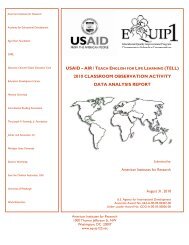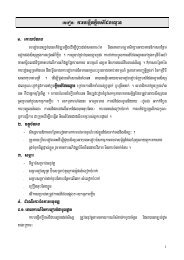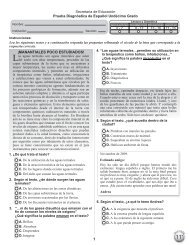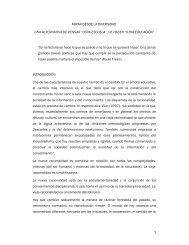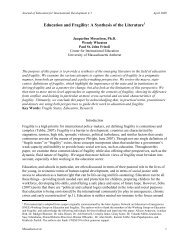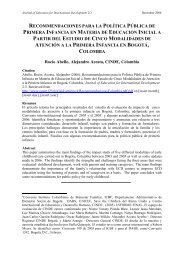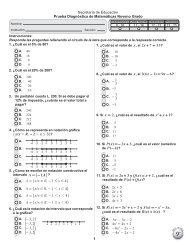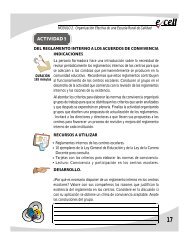The Power of Persistence: Education System ... - EQUIP123.net
The Power of Persistence: Education System ... - EQUIP123.net
The Power of Persistence: Education System ... - EQUIP123.net
You also want an ePaper? Increase the reach of your titles
YUMPU automatically turns print PDFs into web optimized ePapers that Google loves.
Table: Simple, Complicated, and Complex Problems<br />
SIMPLE COMPLICATED COMPLEx<br />
A recipe for apple pie Sending a rocket to the moon Raising a child<br />
the recipe is essential. Formulae are critical and Formulae have limited<br />
necessary.<br />
application.<br />
Recipes are tested to assure Sending one rocket to the moon Raising one child provides<br />
easy replication. increases assurance that the experience, but no<br />
next will succeed.<br />
assurance <strong>of</strong> success with<br />
the next.<br />
No particular expertise is High levels <strong>of</strong> expertise in a Expertise can contribute,<br />
required, but cooking expertise variety <strong>of</strong> fields are necessary but is neither necessary<br />
increases success. for success. nor sufficient to assure<br />
success.<br />
Recipes produce standardized Rockets are similar in critical Every child is unique, and<br />
products. ways. must be understood as an<br />
individual.<br />
the best recipes give good there is a high degree <strong>of</strong> the experience <strong>of</strong> and<br />
results every time. certainty about the outcome. influences on each child<br />
will be different.<br />
optimistic approach to optimistic approach to problem optimistic approach to<br />
problem solving. solving. problem solving.<br />
Source: adapted from Glouberman and Zimmerman, 2002<br />
Uncertainty <strong>of</strong> outcome<br />
remains.<br />
Recent research into complexity theory provides insights into the nature <strong>of</strong> the<br />
education system as a complex, dynamic system. <strong>The</strong> following formulation seeks<br />
to distinguish between different types <strong>of</strong> problems, as a basis for designing and<br />
evaluating interventions (Glouberman and Zimmerman, 2002). In developing an<br />
approach to developmental evaluation, Michael Patton has used this structure to<br />
inform the response to challenges <strong>of</strong> planning and evaluating progress in a nonlinear<br />
system.<br />
Using this framework, education is clearly a complex problem in that progress<br />
is highly context specific, is very dynamic as different factors can influence<br />
outcomes at any time, and is distinctly non-linear. This powerful conceptual<br />
model is useful in thinking about interventions that are designed to affect<br />
education. Of course, a complex system like education contains elements <strong>of</strong> both<br />
simple and complicated problems as well. Some specific education problems<br />
do lend themselves to a linear, causal process, such as providing training to<br />
teachers or distributing learning materials. Some aspects are complicated,<br />
requiring multiple lines <strong>of</strong> expertise, such as curriculum design, assessment, and<br />
information systems.<br />
SECTION 1: INTROdUCTION<br />
31



